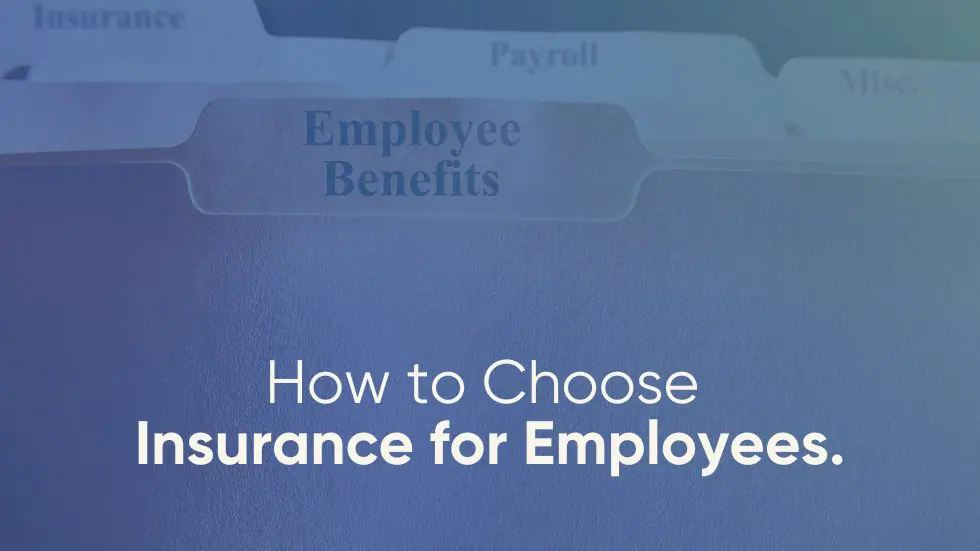Executives like you can experience financial and productivity-related advantages from offering insurance to your employees.
The benefits don’t end there, though. They also extend to individual team members.
If you’re still on the fence about offering insurance to your employees (or expanding your insurance options), this guide may convince you to change your mind.
Below, you’ll learn about the top eight ways your employees will benefit from comprehensive insurance offerings. You’ll also find advice on choosing the right insurance plans for your team.
What are the Main Insurance Benefits?
1. Easier Access to Care
Access is one of the most significant barriers preventing people from regularly seeking healthcare.
When employees receive medical insurance from their employer, they’re more likely to take advantage of those benefits and get the help they need when they need it.
With the right insurance plan, your employees will have an easier time finding healthcare providers (doctors, nurse practitioners, dentists, psychologists, etc.) who accept their insurance and offer quality care.
They will also, in many cases, worry less about the cost of their care. Because they have insurance, they will feel more confident that they can afford to seek treatment and prioritize their well-being.
Furthermore, access to employer-provided insurance can help employees save money by lowering their premiums. Premiums are typically much lower for group benefits than individual plans, which further increases accessibility for your team.
2. Better Physical Health
If your employees have easier access to healthcare, they’ll be more inclined to go to the doctor, especially for preventative care like physical exams, screenings, vaccinations, etc.
Consistently receiving preventative care helps your employees to reduce their risk of developing several chronic health conditions, from high blood pressure to diabetes.
Regular screenings and exams also allow them to learn about potential problems early, meaning they can seek treatment sooner and prevent the issue from escalating.
3. Better Mental Health
Over three-quarters (76 percent) of Americans say that mental health is just as important as physical health. That’s partly why many medical insurance plans also include options for behavioral healthcare, such as appointments with therapists and psychiatrists.
If you provide your employees with behavioral health coverage, you let them know that you care about their mental well-being. You also increase their access to resources that can help them manage stress, anxiety, depression, overwhelm, and other mental health challenges.
As is the case with physical health problems, it’s crucial for your employees to get mental health support early. The sooner they can get treatment for these mental health conditions, the less likely their symptoms are to escalate.
4. Increased Productivity
Physically and mentally healthy employees will naturally feel better at work (and in other areas of their life) than those who are struggling with ongoing symptoms but can’t get to a healthcare professional to have them assessed.
What happens when people feel well on the job? It’s easier for them to focus on their assignments and maximize their productivity.
Most employees want to do their jobs well and make progress toward their goals (both individual and company-wide). However, if they’re constantly dealing with physical or mental health challenges, or if they’re worried about their family being taken care of long-term (which may be the case for those without life insurance), it’s harder for them to make that happen.
Offering options like healthcare coverage and life insurance can help to assuage these fears. Reducing these fears also allows your employees to free up some brain space to focus on their responsibilities at work.
5. Easier Plan Selection
Through the Affordable Care Act, all Americans can purchase health insurance individually through the healthcare.gov marketplace. They can also pay for coverage directly through a private insurance carrier.
However, with so many plans to choose from, it can be challenging to decide which one is the right fit for them.
When you offer group insurance to your employees, you simplify the plan selection process and help them save time. Because you’ve chosen their insurance options, your employees just have to decide whether or not they want to opt in.
6. Tax Advantages
Employers aren’t the only ones who experience tax advantages related to insurance benefits. Your employees also get to enjoy some perks!
In addition to having access to lower insurance premiums than if they bought insurance individually, your employees can typically contribute to their premiums from their pre-tax salaries, which lowers their total tax bill.
They can also make additional contributions to Health Savings and Flexible Spending Accounts (HSAs and FSAs), which offer further tax benefits.
7. Increased Job Satisfaction
Everybody wants to feel satisfied with their job, right? Well, adequate insurance coverage can increase employees’ likelihood of being content at work and wanting to stick with their employer long-term.
The results of one survey revealed that 61 percent of respondents would change jobs for better health insurance. Roughly 89 percent of workers whose companies support employee well-being also say they’re more likely to recommend their company to job seekers.
Remember that happy employees are productive and engaged employees. They get more done, have better attitudes, and provide better customer service — all of which contribute to your company’s reputation and profitability.
8. Peace of Mind
Finally, individual employees benefit from insurance because it gives them peace of mind.
Even those who are generally healthy and aren’t worried about their dependents enjoy knowing that if something did go wrong, they would have coverage and wouldn’t have to foot the bill entirely by themselves.
For many, this peace of mind is priceless (or, at least, worth the cost of their insurance premium!).
What Insurance Benefits Should You Offer?
If you’re convinced that you should start offering insurance coverage to your employees, the first step is to decide what kinds of plans you want to provide.
The following are some of the most popular (and most appreciated by employees) options to consider:
- Medical Insurance: Covers doctor visits, hospital visits, emergency care, prescription drugs, etc.
- Dental Insurance: Covers dentist visits, cleanings, fillings, etc.
- Life Insurance: Provides beneficiaries with a sum of money after the employee passes away
- Supplemental insurance: Short-term disability, long-term disability, MediGap for Medicare, accident, cancer, etc.
At a minimum, most employers will offer some kind of medical coverage. You can choose a combination that works best for your team, though.
Looking for benefits in life insurance? Read 10 Reasons you should Consider Buying Life Insurance for your Employees
How to Choose Insurance for Employees
Once you’ve chosen the kinds of plans you want to offer, you’ll need to select specific group insurance plans for your employees to sign up for.
The following are some of the most important factors to keep in mind when deciding on the best insurance offerings:
Employee Needs
First, think about your employees’ needs regarding healthcare, disability insurance, life insurance, etc. While it’s unlikely that you’ll be able to make everybody happy with your choice, you can try to cater to as many team members as possible.
If you’re unsure about offering a particular benefit, consider asking your employees for feedback. Find out what kinds of coverage matter most to them, then use that information to make your final decisions.
Recommendations/Referrals
Sometimes, talking to another business owner about their insurance offerings can help you decide what’s best for your company and your staff. You can use this information to create a short list of candidates that you can research more closely.
If possible, consult someone who runs a similar-sized business so you can get more accurate information on things like premium prices.
Carrier Options
The next step is to evaluate different insurance carriers and select one that offers the best group plans.
Think about your employees’ needs and the details they’ve provided, then search for carriers with plans that best align with that information. Consider the cost of the program (and how much your employees will pay for their premiums), too.
It may be helpful to rank carriers based on criteria like coverage, premiums, and plan type (HMO, PPO, etc.). This approach will help you stay organized as you weigh the pros and cons and ensure you don’t forget any necessary details.
Pay attention to each carrier’s reputation and reviews as well. Look for insurance carriers that are likely to be around long-term (this is especially important for life insurance, as your employees’ beneficiaries won’t get any kind of payout if the carrier goes out of business before they pass away).
Comprehensiveness
Take note of how comprehensive each carrier’s insurance plans are, too.
For example, do they include options like dental and vision or disability insurance? Does the coverage seem worthwhile for your employees?
These supplemental policies aren’t essential to every team member, but they can still be beneficial to those who require them (or who might need them in the future).
Convenience
Your employees will almost certainly appreciate an insurance plan that makes it convenient for them to search for and make appointments with healthcare providers.
Does the plan offer an extensive network so employees don’t have to drive far away just to see a doctor or dentist? Does it include telehealth options? Can they easily search for providers through the carrier’s website or app?
Worried about your Budget? Don’t worry! We can help, Read How to Offer Benefits to your Employees with Little or no Budget
When in Doubt, Ask an Expert
If you don’t want to go through the process of choosing insurance plans alone, reach out to an insurance consultant and ask for their advice.
A consultant can answer your most pressing questions, from “What is the average life insurance cost?” to “Is it mandatory for me to offer my employees health insurance?”
They can also provide you with expert insights into different carriers and policy options to find one that works with your budget and provides your employees with the coverage they need and deserve.
Questions to Ask an Insurance Consultant
When you first meet with an insurance consultant, or when you’re trying to decide which one to work with, these questions can help you select the most suitable person to guide you through the insurance-purchasing process:
Can You Tell Me About Your Experience?
Find out how long they’ve worked in the insurance consulting field and what kind of training/education they’ve received previously.
It also helps to ask about the types of clients they typically work with and whether they have experience assisting business owners in your industry.
What Kinds of Certifications Do You Have?
Find out if they are ACA-certified and understand the inner workings of the country’s complex healthcare policies. Ask about their continuing education efforts and how they stay informed about the latest changes in the insurance world as well.
What Kinds of Insurance Plans Do You Offer?
It’s not necessary, but it can definitely be helpful to find an insurance consultant who can assist you with selecting all kinds of insurance plans, from medical and dental to life and supplemental.
If they can assist with choosing all these plans, they can help you save time, and you can feel confident that you’re working with an expert when making all of your insurance decisions.
Do You Offer Free Quotes?
The best insurance consultants care about fostering long-term relationships with their clients.
That means they won’t try to rush or pressure you into making a decision. They will answer your questions, give you time to weigh your options, and offer free quotes for easy comparison.
Be wary of a consultant that won’t give you a free quote or who seems like they’re trying to push you to choose before you’re ready.
Still unsure? Read 10 Reasons Why Employee Benefits are Important
Get Help with Employee Benefits Today
Do you want your employees to experience all the advantages of employer-provided insurance? If so, follow the tips listed above to select the best plans.
If you’re overwhelmed by the various group plan benefits that you can choose for your employees, remember that you don’t have to go through the process alone. Partner with an experienced insurance consultant instead.
At Commercial Benefits Services, our ACA-certified team works with mid-to-large-sized business owners, HR professionals, and office managers to help them pick the best plans. We strive to establish long-term relationships with our clients and are dedicated to helping you make the right decision for you and your employees.
Contact us today to schedule a consultation.
Don’t just take it from us, Take a Look at what our clients are saying about us!













